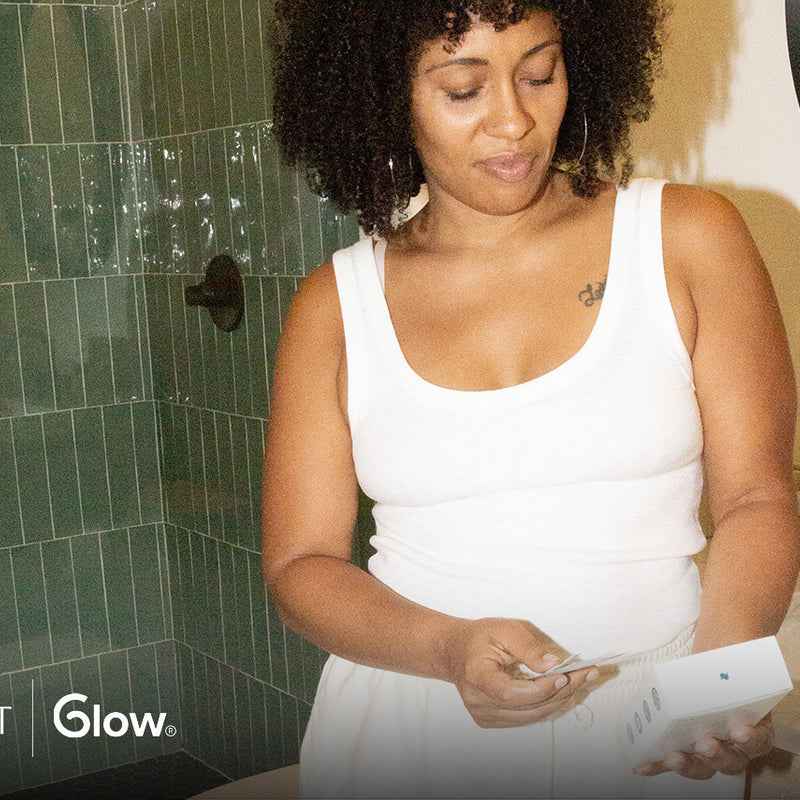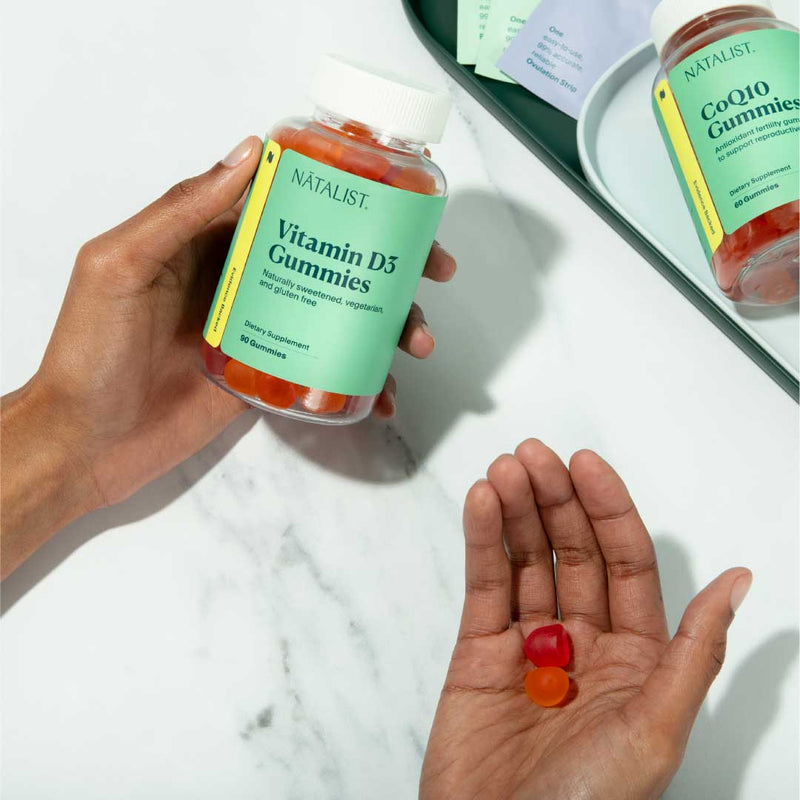Am I Getting Enough Calcium?

Calcium is the most abundant mineral in the body, but many of us don’t meet the recommended amount through diet. This guide discusses the importance of calcium and how much you need during TTC and pregnancy.
What Is Calcium?
Calcium is the most abundant mineral in the body and is key in the formation of healthy bones and teeth, nerve conduction, intracellular signaling, and muscle function.1 Most calcium you consume is stored in bones and teeth, where it supports their structure and hardness. The body also needs calcium for muscles to move and for nerves to carry messages between the brain and the rest of the body. In addition, calcium is used to help blood vessels move blood throughout the body and to help release hormones and enzymes that affect almost every function in the human body. Wow, that’s a lot of jobs for one mineral!
How Much Calcium Do I Need When Trying to Conceive or Pregnant?
Calcium supplementation during pregnancy ensures that you can meet the demands of your growing baby and ensure solid bone health. It is recommended that all adults aged 19-50 consume 1,000 mg of calcium per day.1 That amount is the same for all pregnant women, except pregnant teens, who should get 1,300 mg of calcium per day, whether that be through a food source, or calcium supplements. The best way to meet the recommended intake is through your diet.1 But how do you know if you’re consuming enough calcium?
Here are some common foods and their calcium content:
- One cup of yogurt = 350 mg
- Three ounces of canned sardines = 325 mg
- One cup of milk = 300 mg
- One ounce of cheddar cheese = 200 mg
- One slice of pizza = 120 mg
- Half cup of ice cream = 60 mg
- Half cup cottage cheese = 60 mg
- Two tortillas = 53 mg
- One cup of broccoli = 50 mg
- One slice of bread = 20 mg2
As you can see from this list, many calcium rich foods are dairy food. But what if you’re vegan or lactose intolerant? Suitable sources of calcium would include green vegetables like spinach leaves, green cabbage, fennel, and broccoli, as well as soy milk, nuts, calcium-rich mineral water, and food products that are fortified with calcium.3
Does My Prenatal Have Enough Calcium?
Pregnant women have more effective calcium absorption than non-pregnant women, especially during the last half of pregnancy when fetal demands on maternal calcium are greatest. However, the Dietary Guidelines Scientific Report estimated that almost a quarter of pregnant women in the United States consume less than 800 mg per day.4
How much calcium to look for in a prenatal depends on how much calcium you are consuming through your food sources. If you are vegan, lactose intolerant, or think you may not be reaching the 1,000 mg/day recommendation, then look for a prenatal that has at least 100 mg of Calcium.
Note that no prenatal will meet 100% of your recommended calcium intake. Most prenatals have low amounts of calcium because calcium may interfere with iron absorption. If you need to take a separate calcium supplement, it is recommended to take it at a different time from your prenatal vitamin.
Additionally, if you are taking a separate calcium supplement, it’s best to take it in doses under 500 mg at a time.1 This is because the amount of calcium that is absorbed in your body decreases as the amount of calcium increases. For example, if your doctor advises you to take 1,000 mg/day of calcium in a supplement, you might split the dose and take 500 mg at two separate times during the day.
Calcium Deficiency
Low calcium levels often do not cause symptoms, until it’s too late. But if levels are low for too long, you may experience symptoms like:
- Dry skin
- Brittle nails
- Coarse hair
- Muscle cramps in the back and legs5
The medical term for a calcium deficiency is hypocalcemia. If untreated over time, it can cause neurological or psychological symptoms such as memory loss, delirium, depression, and hallucinations.
If you are concerned about a calcium deficiency, your doctor can order a blood test to measure calcium levels. The good news is that calcium deficiency is easy to treat, and symptoms disappear when the calcium level is restored back to normal.
Calcium Carbonate vs. Citrate
The two main forms of calcium in supplements are carbonate and citrate.
- Calcium carbonate is the most common and affordable type of calcium supplement. Because calcium carbonate depends on stomach acid for absorption, it should be taken with food.
- Calcium citrate is absorbed equally well when taken with or without food. Calcium citrate is also useful for people with low levels of stomach acid, inflammatory bowel disease, or gastric absorption disorders.1 And for everyone with pregnancy-induced nausea, vomiting, and queasiness, Calcium citrate is less likely to cause side effects like gas, bloating, or constipation.1
We chose to use calcium citrate in the Natalist Prenatal Daily Packs, because it’s less likely to cause side effects.
Why Calcium Is Important During Pregnancy
Women who don’t get enough dietary calcium (<500 mg/day) may be at risk for increased bone turnover during pregnancy.6 Without adequate calcium intake, the body steals it from the bones which leads to bone loss. But adequate calcium intake is associated with improved calcium balance, increasing bone mass, and providing a protective effect against bone loss during pregnancy.
Research shows that calcium supplementation in pregnancy has the potential to decrease the risk of developing hypertensive disorders during pregnancy, which are associated with preterm birth, the leading cause of early neonatal and infant mortality.6
Additionally, a systematic review of 13 clinical trials involving 15,730 pregnant women concluded that pregnant women consuming low amounts of calcium could reduce their risk of preeclampsia by 31–65% if they consumed an additional 1,000 mg of calcium each day.7 The study found good quality evidence that calcium supplementation with high doses (>1,000 mg/day) during pregnancy is a safe and relatively cheap way of reducing the risk of preeclampsia. Although extremely encouraging, more studies are needed to confirm these findings.
Key Takeaways
- Calcium is a natural mineral found in many foods that is vital to your health, especially when pregnant.
- All adults aged 19-50 should consume 1,000 mg of calcium per day. This amount is the same for all pregnant women, except pregnant teens, who should get 1,300 mg of calcium per day.
- If your diet doesn’t contain enough calcium, you should talk to your doctor about taking a supplement.
- No prenatal will meet 100% of your recommended intake, but look for a prenatal vitamin with at least 150 mg to help supplement your diet.
- Look for calcium citrate, which has fewer side effects and can be taken with or without food.
Dr. Kenosha Gleaton is board-certified in gynecology and obstetrics and is the Medical Advisor of Natalist. She received her MD from MUSC and completed her residency at Carolinas Medical Center in Charlotte, NC.
Dr. Gleaton is passionate about women, youth, and mentoring. She is a Scrubs Camp instructor, a program to increase student entry in healthcare, and serves as a Compassion International adoptive parent. She is also a member of the American College of Obstetrics & Gynecology, the American Association of Gynecologic Laparoscopists, and the American Association of Professional Women.
Sources:
- National Institutes of Health. Office of Dietary Supplements - Calcium. Nih.gov. Published December 6, 2019. https://ods.od.nih.gov/factsheets/Calcium-Consumer/
- A list of calcium content. courses.washington.edu. Accessed November 30, 2023. http://courses.washington.edu/bonephys/ptinfo/ptcalist.html
- Information NC for B, Pike USNL of M 8600 R, MD B, Usa 20894. How Can I Get Enough Calcium? Institute for Quality and Efficiency in Health Care (IQWiG); 2018. https://www.ncbi.nlm.nih.gov/books/NBK279330/
- USDA. DIETARY GUIDELINES for AMERICANS EIGHTH EDITION.; 2015. https://health.gov/sites/default/files/2019-09/2015-2020_Dietary_Guidelines.pdf
- Lewis J. Hypocalcemia (Low Level of Calcium in the Blood). Merck Manuals Consumer Version. Published 2018. https://www.merckmanuals.com/home/hormonal-and-metabolic-disorders/electrolyte-balance/hypocalcemia-low-level-of-calcium-in-the-blood
- Kumar A, Kaur S. Calcium: A Nutrient in Pregnancy. The Journal of Obstetrics and Gynecology of India. 2017;67(5):313-318. doi:https://doi.org/10.1007/s13224-017-1007-2
- Gj H, Ta L, An A, L D, Mr T. Calcium Supplementation During Pregnancy for Preventing Hypertensive Disorders and Related Problems. The Cochrane database of systematic reviews. Published June 24, 2014. https://pubmed.ncbi.nlm.nih.gov/24960615/
Related Blogs
Sign up for 15% off your first order!
Insider access, exclusive deals, and OBGYN insights!
Reach Out, We're Here
Have questions about your order or products? For the speediest answer, check out our FAQ section. Need something else? Come find us below.
Customer Support
support@natalist.com
Press Inquiries
media@everlyhealth.com
Business & Partnerships
team@natalist.com
Affiliates + Influencers
team@natalist.com
Job Openings
Careers Page






















